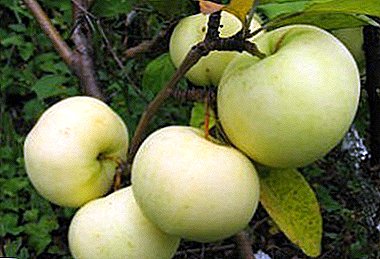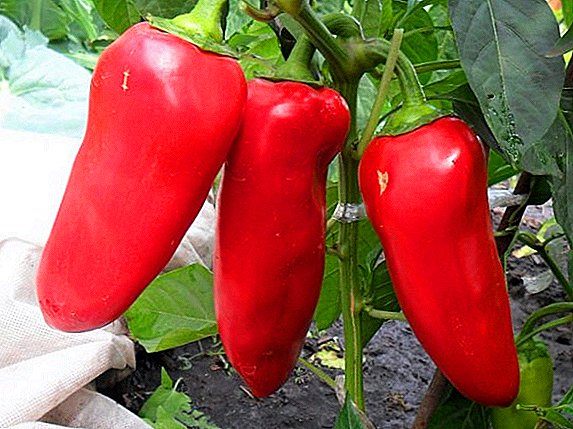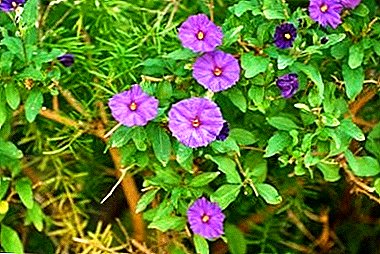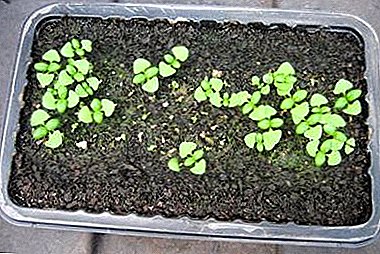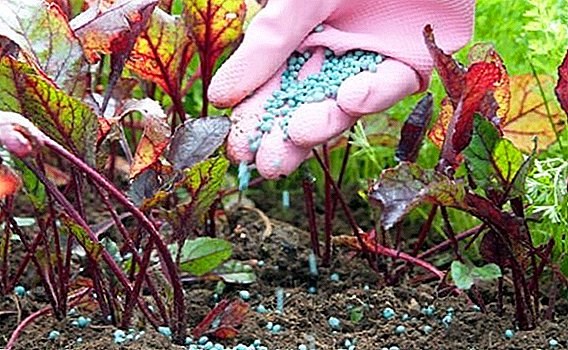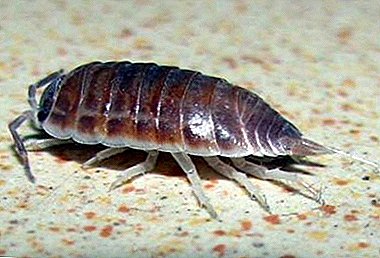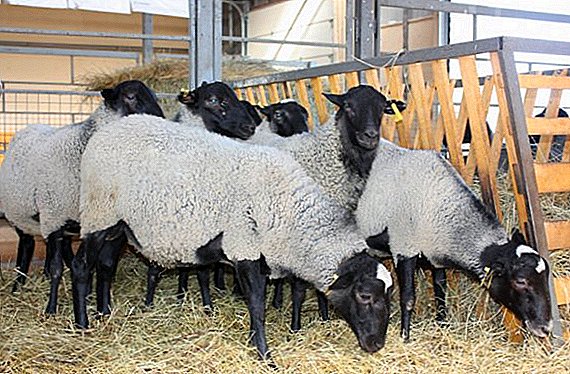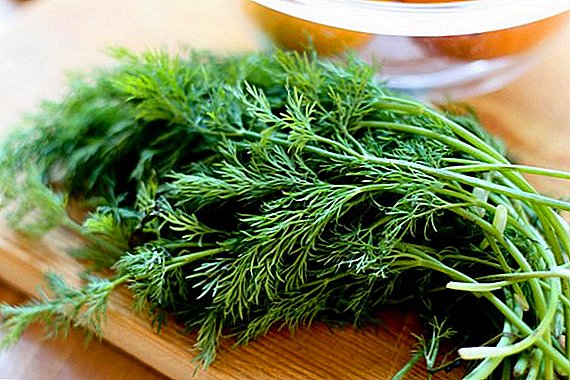 Coriander (lat. - Coriandrum) is an annual herbaceous etromaslennoe plant of the umbrella family.
Coriander (lat. - Coriandrum) is an annual herbaceous etromaslennoe plant of the umbrella family.
Many people know coriander because of its seeds, which are used as an aromatic food spice, or because of the stems and leaves, which are called cilantro (quinda) and used as a spicy herb.
Less familiar is coriander as a honey plant, giving tasty and very healthy honey.
Did you know? Coriander seed cultivated in ancient Egypt and ancient Greece. Since that time, it is known not only for its taste, but also as a healing tool.
Homeland culture - the Mediterranean. Today this plant is cultivated in many countries of the world, especially it is popular in the South Caucasus, Central Asia, and the Crimea.
In addition to using it as a spice and honey plant, this herb also contains fatty technical oil and essential oil. The latter is widely used in perfumery and alcoholic beverage production. Other names for this grass are kishnets, kolyandra, klopovnik.
 Coriander is rich in fats, proteins and carbohydrates, its leaves contain carotene, vitamins, mineral salts.
Coriander is rich in fats, proteins and carbohydrates, its leaves contain carotene, vitamins, mineral salts.
The fruits of the plant have choleretic properties, promote expectoration and improve digestion. They are mainly used in baking and as a seasoning for various dishes, pickles and for flavoring vinegar.
Features of cilantro honey (taste and appearance)
Coriander honey is transparent and belongs to dark varieties: it can be from amber to light brown. His taste is sharp, with a taste of caramel, and he also has a spicy aroma.
The structure of honey granular. Crystallization into a coarse-grained mass occurs rather quickly - within one to two months after pumping out.
Over time, this product does not harden, remaining soft and plastic. With long-term storage, it is not moldy and retains high nutritional and taste qualities.
Such his ability confirms that honey from coriander has an antimicrobial effect.
Important! If honey deviates from its characteristic color range, it means that it contains impurities or it is collected from herbs.
The low popularity of coriander honey is explained by the fact that it is very difficult to produce.
 First, despite the fact that coriander is quite common in the wild, large plantations with this plant, sufficient to collect a good crop of nectar, do not exist.
First, despite the fact that coriander is quite common in the wild, large plantations with this plant, sufficient to collect a good crop of nectar, do not exist.
Secondly, since coriander is not very pleasant and smells sharply during flowering, its smell does not attract insects. The aroma is so unpleasant that even the grass got its name from the word "koris" - translated as "bug". The stench disappears as the plant ripens.
Thirdly, cilantro is quite whimsical and grows only in warm countries.
How to get coriander honey
Usually, in order to obtain honey from cilantro, beekeepers are forced to place beehives in close proximity to flowering fields, thus excluding the alternative for other bees to bees.
If the insects are busy only collecting honey from coriander and do not switch to other melliferous plants, you can count on a seasonal harvest from 1 hectare to 200 kg of honey. On average, the cilantro medoproductivity is 60-120 kg / 1 ha. It's not that much.
Did you know? For comparison: from 1 ha of acacia for the flowering season it is possible to get 500-1000 kg of honey; with buckwheat - 60-70 kg; from clover - 400-500 kg; 1000 kg from linden; from sunflower - 30-40 kg.
Chemical composition of coriander honey
 The nutritional value of honey from coriander is 1314 kJ (314 kcal). 100 g of the product contains 0.8 g of proteins and 81.5 g of carbohydrates, no fats.
The nutritional value of honey from coriander is 1314 kJ (314 kcal). 100 g of the product contains 0.8 g of proteins and 81.5 g of carbohydrates, no fats.
The sharp spicy aroma and taste of coriander honey is explained by the presence of a large amount of essential oils in it - there are more than 10 types of them (in the coriander itself - 36).
The dark color of honey gives a high content of trace elements in it, in particular iron, manganese and copper. In addition, the chemical composition of honey includes vitamins of group B (B1, B2, B9, B6), PP, C and many other elements. There are more than 300 minerals and trace elements in coriander honey.
Useful properties of coriander honey
Due to the complex chemical composition, coriander and honey from it are valuable food products with unique taste and beneficial properties.
In addition, honey also has preservative and medicinal properties that can both get rid of all sorts of diseases, and strengthen the immune system of the person as a whole.
Here is a small list of them:
- antiseptic;
- choleretic;
- antispasmodic;
- wound healing;
- expectorant;
- pain killer.
 Substances that are part of honey, can slow down the heart rhythm and gently excite the central nervous system. Honey is good for stress, depression, chronic fatigue, and also helps with tachycardia.
Substances that are part of honey, can slow down the heart rhythm and gently excite the central nervous system. Honey is good for stress, depression, chronic fatigue, and also helps with tachycardia.
Due to its high iron content, cilantro honey can greatly benefit people with anemia.
One of its beneficial effects is a decrease in blood sugar. It is recommended to cleanse the vessels and restore their elasticity, to improve vision.
Due to its bronchodilator properties, honey has proven itself in the treatment of bronchitis and bronchial asthma. They are also advised to lubricate the oral cavity for diseases of the mucous membrane.
To the list of properties that will easily explain why coriander honey is useful, you can add a very significant and beneficial effect for men - the ability to increase potency.
How to use cilantro honey, coriander honey
Due to the wide range of medicinal properties, cilantro honey has found application in several areas: medicine, cosmetology, cooking. It is taken both internally and externally. We give several recommendations for its use.
 For the general improvement of health, health promotion in general, reducing the risk of colds, improving vision and digestion, it is recommended to take one tablespoon of coriander honey 30-40 minutes before bedtime. Honey can be diluted in cup of warm water or milk.
For the general improvement of health, health promotion in general, reducing the risk of colds, improving vision and digestion, it is recommended to take one tablespoon of coriander honey 30-40 minutes before bedtime. Honey can be diluted in cup of warm water or milk.
Important! Before you start taking honey from coriander and try its medicinal properties on your body, familiarize yourself with the contraindications to its use and consult with your doctor.For colds recommended milk or tea with honey. However, it is worth noting that the beneficial properties of the bee product are destroyed at a temperature of 50 ºС.
To increase hemoglobin in the blood can be taken 1-2 times a day ripe banana with one tablespoon of honey.
For diseases of the oral cavity (stomatitis, gingivitis, sore throat), honey is applied to the finger wrapped with a bandage and smeared with the mucous membrane or throat.
You can also just dissolve the honey, or rinse your mouth three times a day with an extract of chamomile flowers, which is prepared as follows: one tablespoon of chamomile pour 200 g of boiling water, cool, strain and add one tablespoon of coriander honey.
For hemorrhoids, you can use coriander honey, both internally and externally. Sometimes on an empty stomach, twice a day, take an infusion of one cabbage leaf with the addition of one tablespoon of honey.
You can also lubricate the inflamed nodes with liquid honey or a mixture of beet juice, coriander honey and vegetable oil (1: 1: 1).
 With impotence, you can try honey balm. For its preparation, you will need 500 g of crushed aloe leaves (3-5 years old), 500 g of honey and half a liter of red wine (16-17º).
With impotence, you can try honey balm. For its preparation, you will need 500 g of crushed aloe leaves (3-5 years old), 500 g of honey and half a liter of red wine (16-17º).
Balm should be insisted five days in a dark and cool room. After that, strain and take a teaspoon three times a day for an hour and a half before meals.
A week later, the dose is increased to one tablespoon. The course of treatment is a month, and after a week break it can be repeated again.
For cosmetic purposes, honey is added to the mask for problem skin. In particular, coriander honey helps to solve the problem of rashes and acne.
Anti-acne use decoction of sage leaves (1 tablespoon of leaves per cup of boiling water), infused for an hour, with the addition of a spoon of honey. It is applied by way of lotions three times a day.
You can also just Heat a small amount of honey and lubricate problem areas of the skin or, for 15 minutes, apply it in the form of a mask.
Coriander honey: contraindications
 Coriander honey can be both beneficial and harmful. Therefore, first you need to understand that any honey is an allergic product, which means that before using it, it is necessary to exclude the individual intolerance of this product.
Coriander honey can be both beneficial and harmful. Therefore, first you need to understand that any honey is an allergic product, which means that before using it, it is necessary to exclude the individual intolerance of this product.
It is also important to understand that honey can not be the main medicine, but only an adjunct in the treatment.
In addition, you should not deviate from the recommended doses. Daily consumption for an adult should be limited to 100 g, for a child - 30 g. Above this norm, it is not recommended to take the product in order not to harm the body.
Pregnant women and lactating mothers should make a consultation with a gynecologist and a pediatrician before making a decision on the systematic use of honey. This also applies to children under two years. Caution should be taken product and diabetics.
When using coriander honey, contraindications may also apply to people who are taking any medications. In this case, the consultation of the attending physician is obligatory in order to avoid incompatibility and side effects.
In order for honey to retain its beneficial properties as long as possible, you need to know about the conditions of its storage. So, the storage space should be dark, dry and cool, but it is desirable that the honey is not stored in the refrigerator.
The optimum temperature is + 4 ... +18 ºС, the maximum allowable rate is +35 ºС. Storage container is better to choose from glass or plastic. It is strictly forbidden to store honey in an iron package, it can give it toxic properties. 


